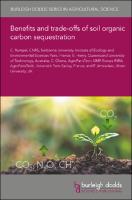Benefits and trade-offs of soil organic carbon sequestration
Author(s)
Rumpel, C.
Henry, Beverley
Chenu, C.
Amiraslani, F.
Language
EnglishAbstract
Soil organic carbon sequestration has received increasing attention due to the important benefits it can have for ecosystem services and in particular food production, climate change mitigation and adaptation. Indeed, soils rich in organic carbon are, in general, more fertile and support plant growth better than carbon-depleted soils. On the other hand, management practices applied to increase soil organic carbon may have trade-offs in terms of nutrient and water requirements and greenhouse gas emissions. In this chapter, we present the biophysical and socioeconomic benefits and trade-offs of soil carbon sequestration and show that they are specific with regards to different organic matter types. We present quantitative studies demonstrating these effects with a particular focus on trade-offs in the form of greenhouse gas emissions from agriculture, and conclude that these are crucial to accurately evaluating soil organic carbon sequestration and its contribution to climate change mitigation and other ecosystem services.
Keywords
greenhouse gases; water; socioeconomy; soil organic carbon; soil carbon sequestrationDOI
10.19103/AS.2022.0106.06ISBN
9781801466974, 9781801466974Publisher
Burleigh Dodds Science PublishingPublisher website
https://bdspublishing.com/Publication date and place
Cambridge, 2023Imprint
Burleigh Dodds Science PublishingSeries
Burleigh Dodds Series in Agricultural Science,Classification
Sedimentology and pedology
Agronomy and crop production
Sustainable agriculture
Agricultural science


 Download
Download